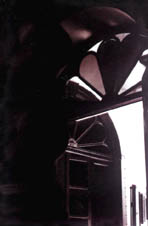
Seminário de São José (St. Joseph's Seminary). LEONARDO JOSÉ PINTO CARDOSO. Photograph. 1995. 2nd Prize.
It is true that without its architectural heritage, Macao would not exist.
Without its particular urban design, without its historical buildings, Macao would be the same as several other nearby cities, as alike as two drops of water.
Macao's heritage is one of the most remarkable factors of difference and identity, a priceless asset of unrivaled value, both materially and spiritually.
For this reason, and as we approach the turn on the century and the end of a Portuguese cycle, RC is dedicating the following two editions to Macao's architectural and urban heritage.
Our heritage has given the dynamic, qualitative and binding respect we have for an outstanding culture. We do not fall into the temptation of fatalistic historians who analyse heritage chronologically: the various cycles in the past overlapping each other, superimposing and engulfing the previous one.
We have a vision or horizontal projection of our heritage, the only revitalising, flexible and continuous thing that reflects the spirit's movement through time.
There is no other way of understanding except that of accepting the historical layers like chains of continuity and giving our heritage this spiritual function which can articulate a coherent future.
This is what today seems to be the golden rule, not only for generations of the same nation, but above all in this century, for the community of nations.
The proclamation of our heritage as one of universal importance is a stop above the pathway to humanity's brotherhood, now that we are forced to live in a 'global village'.
As futures are more and more intertwined, so we have more in common from our collective past of mankind, populating and enjoying this planet.
The last decades have led to the discovery of the 'Other', to taking possession of the 'Other' which makes all ethnocentrisms and paths to universally collide.
A respect for heritage is what most encompasses man's dream of eternity, going beyond the eschatology of universal brotherhood.
In the past the destruction of famous national heritages will always be associated with times of hatred among men throughout history.
We are romantics: we cry with longing for the Hanging Gardens of Babylon which we have never seen, where Nebuchadnezzar frolicked in the verdant pastures.
And we cry for the Library of Alexandria, the Palace of Xerxes, the Tang Court, the Temple of Solomon...
We would have known so much about these periods if their heritage had survived for what remains are only remnants, definitive realisations of the spirit.
We do not have visible and enlightening relics of past epochs but incarnations of immortal moments of the spirit, living manifestations where the most distant past comes to an end in the far off future. Longing comes from the past and the future as it emerges from the infinite. Venerating one's heritage is a way of satisfying just such a longing.
For this reason we can relish in the task over the last ten years of recuperating and revitalising Macao' s heritage.
We believe that future intelligent and sensitive generations will transform their triumphs and golden weapons, will look at the old walls surrounding them and without books or teachers, see what they already know: Macao as a universal example, a symbol anticipating the time for mankind where all differences are harmoniously reconciled within the same Oneness.

Editorial Director
start p. 3
end p.